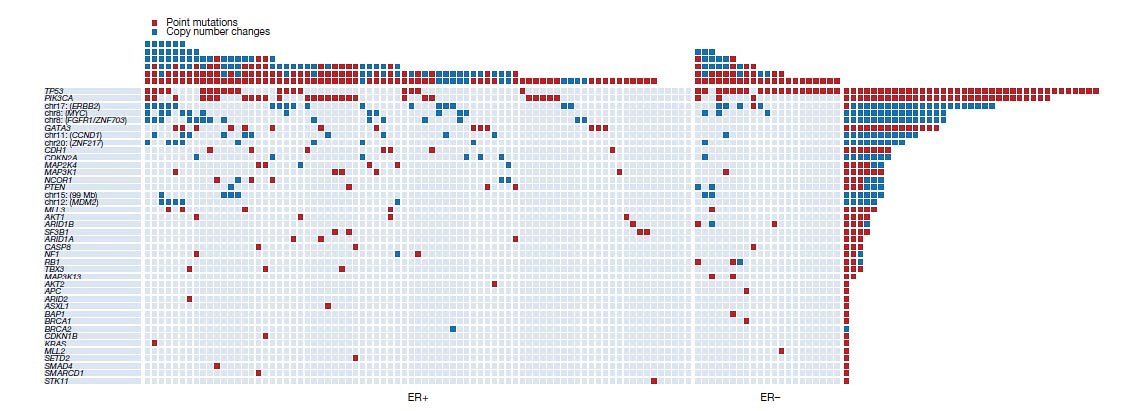Understanding breast cancer

In a study published today in Nature, researchers describe nine new genes that drive the development of breast cancer. This takes the tally of all genes associated with breast cancer development to 40.
The team examined all the genes in the genomes of 100 cases of breast cancer. The mutated cancer-causing genes were different in different cancer samples, indicating that breast cancer is genetically very diverse. Understanding the consequences of this diversity will be important in progressing towards more rational treatment.
Changes to DNA lie behind all cases of cancer. Cancer develops as a result of mutations – called somatic mutations – that are acquired during a person’s lifetime. Driver mutations, which occur in cancer genes, are a small subset of somatic mutations that drive the development of cancer.
“Breast cancer is the most common cancer in women. To identify new cancer genes that lead to the development of breast cancer, we searched for driver mutations in over 21,000 genes, and found evidence for nine new cancer genes involved in the development of this cancer.”
Dr Patrick Tarpey First author from the Wellcome Trust Sanger Institute
These genome analyses provide a direct survey of the landscape of driver mutations in breast cancer. The team found driver mutations were present in at least 40 different cancer genes. Most individual cancers had different combinations of mutated cancer genes, demonstrating the substantial genetic diversity in breast cancer.
“In 28 cases we found only a single driver, but the maximum number of driver mutations in an individual cancer was six. We found that breast cancer can be caused by more than 70 different combinations of mutations.
“If we consider three breast cancers, each with four driver mutations: they might share none of those driver mutations – so each is a different genetic ‘animal’. They are different cancers driven by different genes. We need to classify them as carefully as we can. This study is a step towards that goal.”
Professor Mike Stratton Lead author and Director of the Wellcome Trust Sanger Institute
“One of the most striking things about breast cancer is how it progresses differently in each patient and how each patient responds differently to therapy. Our results can help us to understand these differences.”
Dr Andy Futreal Until recently, Head of Cancer Genomics at the Wellcome Trust Sanger Institute and currently an Honorary Faculty Member at the Institute
Our genomes are scarred by decades of continual assault that leave mutations scattered though our DNA. This is the most comprehensive study thus far of mutations in breast cancers, discovering nine new mutated genes that cause breast cancer, and revealing the full diversity of the driving events that convert normal breast cells into breast cancers.
“The picture is certainly more complicated than we would have wanted, but as with many other things knowledge is our strongest weapon. These comprehensive insights reveal the faulty wiring of the cellular circuit board that causes cells to behave as cancers. Understanding our enemy at this level of detail will allow us to take more rational approaches to therapy, to understand why some cancers respond to drugs and others do not, and direct us to new vulnerabilities to be exploited in new treatments.”
Professor Mike Stratton Sanger Institute
More information
Funding
A full list of funding agencies can be found in the papers.
Participating Centres
A full list of participating centres can be found in the papers.
Publications:
Selected websites
Breakthrough Breast Cancer
Breakthrough Breast Cancer is dedicated to improving and saving lives through finding the causes of breast cancer, enabling early detection, ensuring precise diagnosis, discovering new and better treatments and improving medical services. Breakthrough Breast Cancer funds groundbreaking research, campaign for better services and treatments and raise awareness of the signs and symptoms of breast cancer. Through this work the charity believes passionately that breast cancer can be beaten and the fear of the disease removed for good.
The Wellcome Trust Sanger Institute
The Wellcome Trust Sanger Institute is one of the world’s leading genome centres. Through its ability to conduct research at scale, it is able to engage in bold and long-term exploratory projects that are designed to influence and empower medical science globally. Institute research findings, generated through its own research programmes and through its leading role in international consortia, are being used to develop new diagnostics and treatments for human disease.
The Wellcome Trust
The Wellcome Trust is a global charitable foundation dedicated to achieving extraordinary improvements in human and animal health. We support the brightest minds in biomedical research and the medical humanities. Our breadth of support includes public engagement, education and the application of research to improve health. We are independent of both political and commercial interests.


